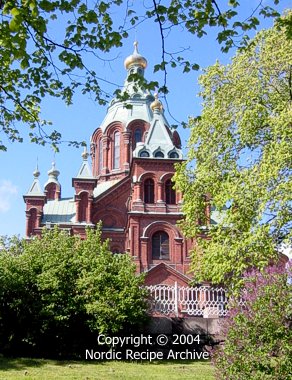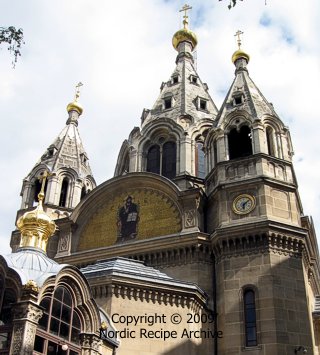 The Greek word for Easter, Pascha (also used in many other countries), was derived from the Hebrew word Pesach, meaning the Jewish festival of Passover. It is believed that the English word Easter was derived
from the name of the pagan Teutonic spring goddess Eastre in the 8th century AD.
The Greek word for Easter, Pascha (also used in many other countries), was derived from the Hebrew word Pesach, meaning the Jewish festival of Passover. It is believed that the English word Easter was derived
from the name of the pagan Teutonic spring goddess Eastre in the 8th century AD.
Easter is celebrated to commemorate the death and resurrection of Jesus. It is the major festival of the Christian calendar,
especially in the Orthodox Christian Church, because by overcoming death Jesus gave man eternal life.
Crucifixion of Jesus
 The crucifixion of Jesus happened at the time of Passover. When the feast was approaching, Jesus left to Jerusalem
with his disciples. He arrived riding on a donkey, and the people who welcomed him as their "true king", were waving palm leaves
as symbols of victory. This day is known as Palm Sunday.
The crucifixion of Jesus happened at the time of Passover. When the feast was approaching, Jesus left to Jerusalem
with his disciples. He arrived riding on a donkey, and the people who welcomed him as their "true king", were waving palm leaves
as symbols of victory. This day is known as Palm Sunday.
On Monday and Tuesday, Jesus spoke to his disciples, predicting his resurrection, his betrayal by the disciples and the fall of false leaders, among other things.
 On Wednesday, his disciple Judas betrayed him, so that Jesus was arrested, brought before the Roman governor Pilate and sentenced to death.
On Wednesday, his disciple Judas betrayed him, so that Jesus was arrested, brought before the Roman governor Pilate and sentenced to death.
On Thursday, Jesus had his last supper with his disciples, and thus the tradition of communion was first practiced. After the supper, he washed the disciples' feet to show that he was to serve them as well as teach them.
Jesus was crucified and buried on Friday.
On Saturday, the Jewish Sabbath, the tomb of Jesus was
sealed so that no one could steal his body and claim he had resurrected.
On Sunday — the Easter Day — Jesus rose from the dead.
Fixing the Easter date
 The first Christians adopted the Easter celebration from the Jewish Pesach, the celebration of which starts on the 14th day of the
month of Nisan, on the day of vernal equinox, but this could be any day of the week.
The first Christians adopted the Easter celebration from the Jewish Pesach, the celebration of which starts on the 14th day of the
month of Nisan, on the day of vernal equinox, but this could be any day of the week.
That Easter should always fall on a Sunday,
the church Council of Nicaea (325 AD) ordered that Easter Day is fixed to fall on the first Sunday after the first full moon
following the vernal equinox. This can occur on any Sunday between March 22nd and April 25th.
The Council, however, did not fix the methods to be used to calculate the timing of the full moon or the vernal
equinox, but let churches to employ the most exact science of the day for calculating the necessary astronomical data.
Easter in east and west
The western and eastern churches always celebrated Easter on the same date for up to the year 1582, when the Roman Catholic Church introduced the Gregorian calendar to replace the prior Julian calendar. The eastern church continued to calculate the Easter date following the Julian calendar and this is why Easter is celebrated at different time in eastern and western churches.
But the methods for calculating the Easter date used by both the calendars rely upon conventional, inaccurate tables for determining the lunar cycle and not on the exact astronomical data.
Note: unlike other Orthodox churches, the Finnish and Estonian Orthodox Churches celebrate Easter at the same time as the western churches (Catholics and Protestants).
 This centuries-long division of churches is by most Christians soon hoped to come to an end.
This centuries-long division of churches is by most Christians soon hoped to come to an end.
On May 15th 2009, in an international interconfessional seminar organised by the Institute of ecumenical studies of the Ukrainian Catholic University in L'viv,
its participants consisting of theologians from Orthodox, Roman Catholic and Protestant churches agreed on the most acceptable and genuinely traditional method for calculating the date of Easter,
based on a compromise proposed at a World Council of Churches consultation in Aleppo, Syria, in 1997.
Picture above: Orthodox cathedral Saint-Alexandre-Nevski in Paris, France.
According to this proposal, Easter is celebrated on the first Sunday after the full moon following vernal equinox, maintaining the norms of the Nicene Council, but using accurate astronomical data available today in calculating this date, based on the Jerusalem meridian, the place of Christ's death and resurrection.
| Roman Catholic / Evangelical-Lutheran Easter Sunday dates |
| Year |
2015 |
2016 |
2017 |
2018 |
2019 |
2020 |
| Date |
April 5th |
March 27th |
April 16th |
April 1st |
April 21st |
April 12th |
| |
| Orthodox Easter Sunday dates |
| Year |
2015 |
2016 |
2017 |
2018 |
2019 |
2020 |
| Date |
April 12th |
May 1st |
April 16th |
April 8th |
April 28th |
April 19th |
